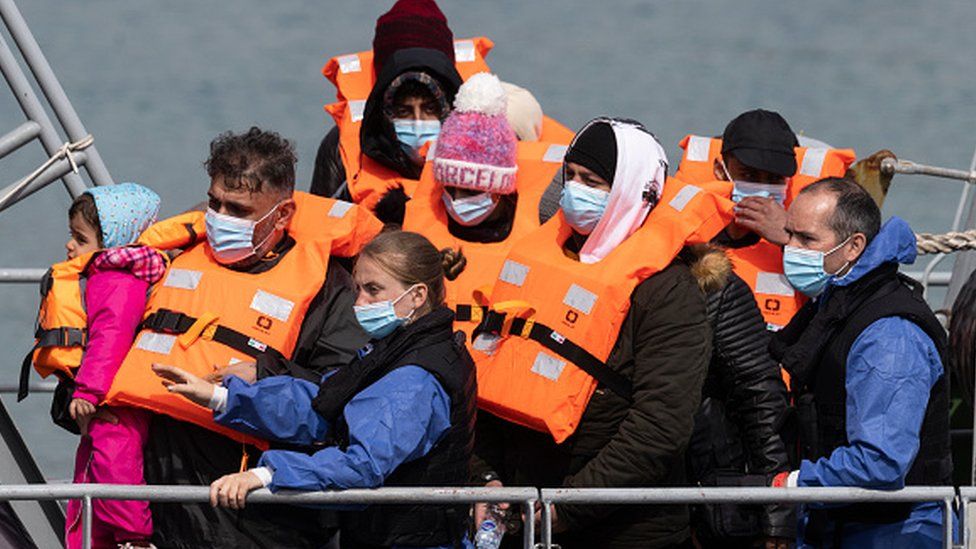ARTICLE AD BOX
 Image source, Getty Images
Image source, Getty Images
By Chris Mason
Political editor, BBC News
The rows about small boat crossings over the Channel are the ultimate example of a political bind.
An international issue, demanding a national response, provoking local anger.
The crossings have shot up. The prime minister has promised to stop them.
At least part of what we are seeing in the debates over sorting places for migrants to stay is the consequence of a failure to do that.
Another element is the colossal backlog of asylum claims that need to be processed. But a significant part of all of this is a generational challenge lots of rich countries will face.
Courtesy of globalisation - smartphones, the internet, satellite television - it has never been easier for poor people in low-income countries, or those caught up in wars, natural disasters or, perhaps in future, the consequences of climate change, to be aware of a richer world they might prefer.
What they might easily conclude is a rational decision to seek a better life. Which means rich countries, and their governments, have to conclude what a rational response to this is.
How can a country be sustainably compassionate, if indeed that is what it chooses to be? And what would that look like, when both of those words would be contested?
Rich countries now have to confront what to do about all this, often still in possession of rules and conventions that pre-date the era of the jet aeroplane and mass international travel.
And they - we - confront these challenges burdened by the weight and contradictions of the dilemmas they generate.
What to do practically, politically, logistically, financially, morally?
Right now, the government confronts an expensive mess.
Solutions sought
As my colleagues Daniel Sandford and Callum May reported earlier this month, more than 51,000 asylum seekers are currently being put up in nearly 400 hotels around the UK.
It is costing the taxpayer £6m a day. The government is desperate to find a solution.
Something cheaper, something more obviously basic (in the hope that that itself acts as a deterrent) and big sites that can house a lot of people.
Former military bases have long been top of the wanted list for ministers - land and buildings relatively easily acquired, that can be converted and up and running quickly. Or so they hope.
The political strategy here is this sort of thing is always going to annoy some people, but fewer bigger sites will annoy fewer people, while housing plenty of people.
The thing is, those they are annoying are getting angry and getting organised.
Conservative-controlled Braintree District Council has asked the High Court to block plans for a migrants site on an old RAF base in Essex.
And a legal battle looms between the Conservative-controlled East Lindsey District Council and the government over a similar plan in Lincolnshire.
Boats floated
Some senior voices in government were talking up the prospect of ferries and barges also being used to house migrants - leading to some excitable newspaper front pages.
Strikingly, while floating accommodation was mentioned by the Immigration Minister Robert Jenrick, there isn't yet any detail about the plans.
Robert Jenrick's plans to use military bases "being disposed of" face criticism from both sides of the Commons.
One figure who worked in government under Labour recalled to me a similar desire to use ships, then to accommodate prisoners.
Suffice to say they were more than a little sceptical that the idea will ever see the light of day.
They recalled one minister back then being packed off to Rotterdam to look at an ailing old boat the Dutch government wanted rid of.
But it was concluded it was so decrepit it probably wouldn't make it over the North Sea and the whole plan was quietly dropped.
The challenge is finding the boats, finding the places to put them and building the associated infrastructure, such as offices nearby on land, to make the whole thing work.
Ministers now do still seem to be pursuing the idea - as BBC South's political editor Peter Henley reports Portland Port in Dorset has been approached by the Home Office to provide space for what is called an "accommodation facility".
But there are no further details.
Critics of the government say a legacy of mismanaging the asylum system means all these problems now stack up. And it is unquestionable the problems are massive.
But it is also unquestionable that the next government, of whatever political colour, will inherit much of the same set of problems.
And they are the same set of problems so many other similar rich countries confront - and will continue to confront for decades to come.

 1 year ago
18
1 year ago
18








 English (US)
English (US)